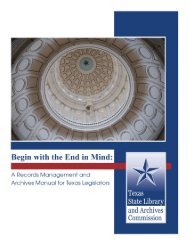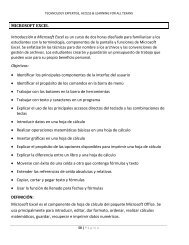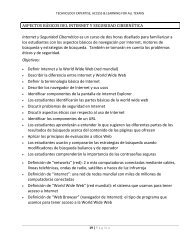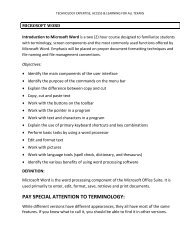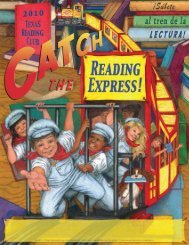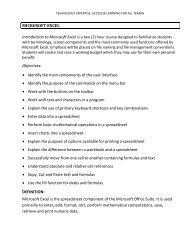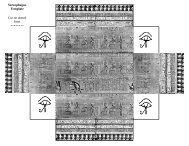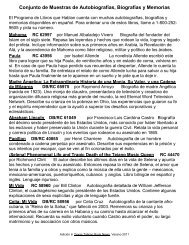- Page 1 and 2: 2006 Texas Reading Club Manual Writ
- Page 3 and 4: Texas Reading Club Manual 3 Table o
- Page 5 and 6: Texas Reading Club Manual 5 Books A
- Page 7 and 8: Texas Reading Club Manual 7 Artist,
- Page 9 and 10: Texas Reading Club Manual 9 • Add
- Page 11 and 12: Texas Reading Club Manual 11 by par
- Page 13 and 14: Texas Reading Club Manual 13 • So
- Page 15: Texas Reading Club Manual 15 one-ti
- Page 19 and 20: Texas Reading Club Manual 19 by the
- Page 21 and 22: Texas Reading Club Manual 21 copyri
- Page 23 and 24: Texas Reading Club Manual 23 planni
- Page 25 and 26: Texas Reading Club Manual 25 • Pu
- Page 27 and 28: Texas Reading Club Manual 27 May 15
- Page 29 and 30: Texas Reading Club Manual 29 offers
- Page 31 and 32: Texas Reading Club Manual 31 April
- Page 33 and 34: Texas Reading Club Manual 33 Folkma
- Page 35 and 36: Texas Reading Club Manual 35 Theme
- Page 37 and 38: Texas Reading Club Manual 37 Readin
- Page 39 and 40: Texas Reading Club Manual 39 NARRAT
- Page 41 and 42: Texas Reading Club Manual 41 Charac
- Page 43 and 44: Texas Reading Club Manual 43 SPORTS
- Page 45 and 46: Texas Reading Club Manual 45 Creati
- Page 47 and 48: Texas Reading Club Manual 47 LITTLE
- Page 49 and 50: Texas Reading Club Manual 49 Puppet
- Page 51 and 52: Texas Reading Club Manual 51 WITCH:
- Page 53 and 54: Texas Reading Club Manual 53 people
- Page 55 and 56: Texas Reading Club Manual 55 Red Ri
- Page 57 and 58: Texas Reading Club Manual 57 Racket
- Page 59 and 60: Texas Reading Club Manual 59 Hansel
- Page 61 and 62: Texas Reading Club Manual 61 Father
- Page 63 and 64: Texas Reading Club Manual 63 Weight
- Page 65 and 66: Texas Reading Club Manual 65 Cottag
- Page 67 and 68:
Texas Reading Club Manual 67 Nameta
- Page 69 and 70:
Texas Reading Club Manual 69 Crafts
- Page 71 and 72:
Texas Reading Club Manual 71 The Ro
- Page 73 and 74:
Texas Reading Club Manual 73 which
- Page 75 and 76:
Texas Reading Club Manual 75 Books
- Page 77 and 78:
Texas Reading Club Manual 77 Gone F
- Page 79 and 80:
Texas Reading Club Manual 79 Videos
- Page 81 and 82:
Texas Reading Club Manual 81 Frere
- Page 83 and 84:
Texas Reading Club Manual 83 Coconu
- Page 85 and 86:
Texas Reading Club Manual 85 Patter
- Page 87 and 88:
Texas Reading Club Manual 87 Trophy
- Page 89 and 90:
Texas Reading Club Manual 89 Daruma
- Page 91 and 92:
Texas Reading Club Manual 91 Refres
- Page 93 and 94:
Texas Reading Club Manual 93 Crafts
- Page 95 and 96:
Texas Reading Club Manual 95 Songs
- Page 97 and 98:
Texas Reading Club Manual 97 Nameta
- Page 99 and 100:
Texas Reading Club Manual 99 game,
- Page 101 and 102:
Texas Reading Club Manual 101 Songs
- Page 103 and 104:
Texas Reading Club Manual 103 Bulle
- Page 105 and 106:
Texas Reading Club Manual 105 Craft
- Page 107 and 108:
Texas Reading Club Manual 107 Bulle
- Page 109 and 110:
Texas Reading Club Manual 109 Direc
- Page 111 and 112:
Texas Reading Club Manual 111 Si es
- Page 113 and 114:
Texas Reading Club Manual 113 Kokon
- Page 115 and 116:
Texas Reading Club Manual 115 Direc
- Page 117 and 118:
Texas Reading Club Manual 117 Mothe
- Page 119 and 120:
Texas Reading Club Manual 119 Crayo
- Page 121 and 122:
Texas Reading Club Manual 121 Brown
- Page 123 and 124:
Texas Reading Club Manual 123
- Page 125 and 126:
Texas Reading Club Manual 125
- Page 127 and 128:
Texas Reading Club Manual 127 Hand
- Page 129 and 130:
Texas Reading Club Manual 129 Tenni
- Page 131 and 132:
Texas Reading Club Manual 131 Apple
- Page 133 and 134:
Texas Reading Club Manual 133 Baseb
- Page 135 and 136:
Texas Reading Club Manual 135 Cupca
- Page 137 and 138:
Texas Reading Club Manual 137 And g
- Page 139 and 140:
Texas Reading Club Manual 139 A sit
- Page 141 and 142:
Texas Reading Club Manual 141 Craft
- Page 143 and 144:
Texas Reading Club Manual 143 Finge
- Page 145 and 146:
Texas Reading Club Manual 145 (Tort
- Page 147 and 148:
Texas Reading Club Manual 147 HARE:
- Page 149 and 150:
Texas Reading Club Manual 149 Profe
- Page 151 and 152:
Texas Reading Club Manual 151 Guest
- Page 153 and 154:
Texas Reading Club Manual 153 Jack
- Page 155 and 156:
Texas Reading Club Manual 155 “Sa
- Page 157 and 158:
Texas Reading Club Manual 157 Hole
- Page 159 and 160:
Texas Reading Club Manual 159 Games
- Page 161 and 162:
Texas Reading Club Manual 161 Presc
- Page 163 and 164:
Texas Reading Club Manual 163 crown
- Page 165 and 166:
Texas Reading Club Manual 165 hands
- Page 167 and 168:
Texas Reading Club Manual 167 puppe
- Page 169 and 170:
Texas Reading Club Manual 169 Bulle
- Page 171 and 172:
Texas Reading Club Manual 171 Stori
- Page 173 and 174:
Texas Reading Club Manual 173 Dance
- Page 175 and 176:
Texas Reading Club Manual 175 Bulle
- Page 177 and 178:
Texas Reading Club Manual 177 Natio
- Page 179 and 180:
Texas Reading Club Manual 179 Goin'
- Page 181 and 182:
Texas Reading Club Manual 181 HORSE
- Page 183 and 184:
Texas Reading Club Manual 183 Books
- Page 185 and 186:
Texas Reading Club Manual 185 Color
- Page 187 and 188:
Texas Reading Club Manual 187 Actio
- Page 189 and 190:
Texas Reading Club Manual 189 Direc
- Page 191 and 192:
Texas Reading Club Manual 191 Patte
- Page 193 and 194:
Texas Reading Club Manual 193 Humpt
- Page 195 and 196:
Texas Reading Club Manual 195 Mothe
- Page 197 and 198:
Texas Reading Club Manual 197 King'
- Page 199 and 200:
Texas Reading Club Manual 199 911 S
- Page 201 and 202:
Texas Reading Club Manual 201 Olymp
- Page 203 and 204:
Texas Reading Club Manual 203 Count
- Page 205 and 206:
Texas Reading Club Manual 205 Runni
- Page 207 and 208:
Texas Reading Club Manual 207 Rabbi
- Page 209 and 210:
Texas Reading Club Manual 209 Tree
- Page 211 and 212:
Texas Reading Club Manual 211 River
- Page 213 and 214:
Texas Reading Club Manual 213 Mill
- Page 215 and 216:
Texas Reading Club Manual 215 Bridg
- Page 217 and 218:
Texas Reading Club Manual 217 Cloud
- Page 219 and 220:
Texas Reading Club Manual 219 Sitti
- Page 221 and 222:
Texas Reading Club Manual 221 Octop
- Page 223 and 224:
Texas Reading Club Manual 223 Clown
- Page 225 and 226:
Texas Reading Club Manual 225 Tuna
- Page 227 and 228:
Texas Reading Club Manual 227 Seali
- Page 229 and 230:
Texas Reading Club Manual 229 Balle
- Page 231 and 232:
Texas Reading Club Manual 231 Horse
- Page 233 and 234:
Texas Reading Club Manual 233 Sport
- Page 235 and 236:
Texas Reading Club Manual 235
- Page 237 and 238:
Texas Reading Club Manual 237 Car T
- Page 239 and 240:
Texas Reading Club Manual 239 Race
- Page 241 and 242:
Texas Reading Club Manual 241 Eleme
- Page 243 and 244:
Texas Reading Club Manual 243 Reade
- Page 245 and 246:
Texas Reading Club Manual 245 Magaz
- Page 247 and 248:
Texas Reading Club Manual 247 • T
- Page 249 and 250:
Texas Reading Club Manual 249 NARRA
- Page 251 and 252:
Texas Reading Club Manual 251 Video
- Page 253 and 254:
Texas Reading Club Manual 253 Displ
- Page 255 and 256:
Texas Reading Club Manual 255 Direc
- Page 257 and 258:
Texas Reading Club Manual 257 The C
- Page 259 and 260:
Texas Reading Club Manual 259 The g
- Page 261 and 262:
Texas Reading Club Manual 261 Video
- Page 263 and 264:
Texas Reading Club Manual 263 And i
- Page 265 and 266:
Texas Reading Club Manual 265 Games
- Page 267 and 268:
Texas Reading Club Manual 267 S and
- Page 269 and 270:
Texas Reading Club Manual 269 Glue
- Page 271 and 272:
Texas Reading Club Manual 271 Incen
- Page 273 and 274:
Texas Reading Club Manual 273 Guest
- Page 275 and 276:
Texas Reading Club Manual 275 Bulle
- Page 277 and 278:
Texas Reading Club Manual 277 The K
- Page 279 and 280:
Texas Reading Club Manual 279 Shirt
- Page 281 and 282:
Texas Reading Club Manual 281 Leaf
- Page 283 and 284:
Texas Reading Club Manual 283 Young
- Page 285 and 286:
Texas Reading Club Manual 285 on th
- Page 287 and 288:
Texas Reading Club Manual 287 Dell
- Page 289 and 290:
Texas Reading Club Manual 289 Bulle
- Page 291 and 292:
Texas Reading Club Manual 291 The C
- Page 293 and 294:
Texas Reading Club Manual 293 Games
- Page 295 and 296:
Texas Reading Club Manual 295 Prepa
- Page 297 and 298:
Texas Reading Club Manual 297 stand
- Page 299 and 300:
Texas Reading Club Manual 299 sport
- Page 301 and 302:
Texas Reading Club Manual 301 Web S
- Page 303 and 304:
Texas Reading Club Manual 303 Direc
- Page 305 and 306:
Texas Reading Club Manual 305 Lance
- Page 307 and 308:
Texas Reading Club Manual 307 Incen
- Page 309 and 310:
Texas Reading Club Manual 309 www.h
- Page 311 and 312:
Texas Reading Club Manual 311 Direc
- Page 313 and 314:
Texas Reading Club Manual 313 Patte
- Page 315 and 316:
Texas Reading Club Manual 315 Aesop
- Page 317 and 318:
Texas Reading Club Manual 317 Two e
- Page 319 and 320:
Texas Reading Club Manual 319 Accus
- Page 321 and 322:
Texas Reading Club Manual 321 Bruch
- Page 323 and 324:
Texas Reading Club Manual 323 Evan
- Page 325 and 326:
Texas Reading Club Manual 325 Mark
- Page 327 and 328:
Texas Reading Club Manual 327 A mul
- Page 329 and 330:
Texas Reading Club Manual 329 Twent
- Page 331 and 332:
Texas Reading Club Manual 331 Funny
- Page 333 and 334:
Texas Reading Club Manual 333 Color
- Page 335 and 336:
Texas Reading Club Manual 335 Hutch
- Page 337 and 338:
Texas Reading Club Manual 337 Kalma
- Page 339 and 340:
Texas Reading Club Manual 339 The L
- Page 341 and 342:
Texas Reading Club Manual 341 Two g
- Page 343 and 344:
Texas Reading Club Manual 343 Birdl
- Page 345 and 346:
Texas Reading Club Manual 345 McCle
- Page 347 and 348:
Texas Reading Club Manual 347 Murph
- Page 349 and 350:
Texas Reading Club Manual 349 Super
- Page 351 and 352:
Texas Reading Club Manual 351 If Yo
- Page 353 and 354:
Texas Reading Club Manual 353 Schwa
- Page 355 and 356:
Texas Reading Club Manual 355 Snyde
- Page 357 and 358:
Texas Reading Club Manual 357 Don
- Page 359 and 360:
Texas Reading Club Manual 359 A col
- Page 361 and 362:
Texas Reading Club Manual 361 Wilso
- Page 363 and 364:
Texas Reading Club Manual 363 Lyric
- Page 365 and 366:
Texas Reading Club Manual 365 Afric
- Page 367 and 368:
Texas Reading Club Manual 367 This
- Page 369 and 370:
Texas Reading Club Manual 369 A Haw
- Page 371 and 372:
Texas Reading Club Manual 371 Toe t
- Page 373 and 374:
Texas Reading Club Manual 373 Play
- Page 375 and 376:
Texas Reading Club Manual 375 www.n
- Page 377 and 378:
READING: the Sport of Champions! Th
- Page 379 and 380:
Borders Use these borders and banne
- Page 381 and 382:
Reading: The Sport of Champions! Re
- Page 383 and 384:
Reading: The Sport of Champions! Re
- Page 385 and 386:
2006 Texas Reading Club 2006 Texas
- Page 387 and 388:
6. 7. 8. 9. 10. 11. 12. 13. 14. 15.
- Page 389 and 390:
Write the total time you read here:
- Page 391 and 392:
6. 7. 8. 9. 10. 11. 12. 13. 14. 15.
- Page 393:
Escribe el total de minutos aquí:


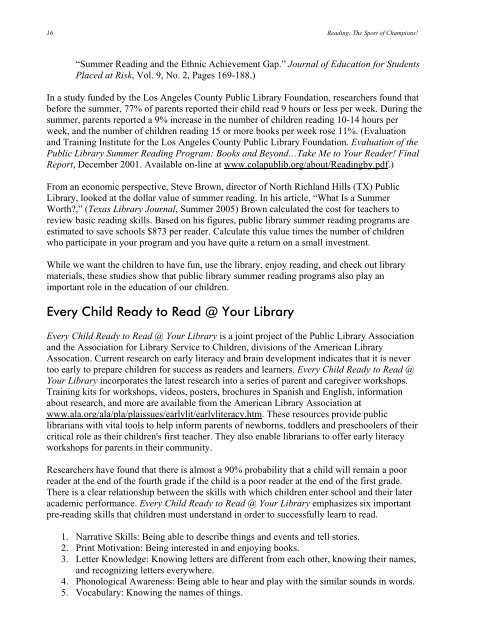
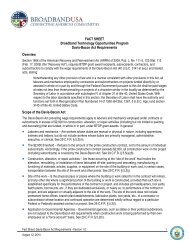
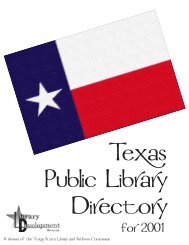
![Harry Potter [pdf]](https://img.yumpu.com/27329912/1/190x245/harry-potter-pdf.jpg?quality=85)
![Aplicaciones del Programa de Libros que Hablan [pdf] - Texas State ...](https://img.yumpu.com/27329907/1/190x245/aplicaciones-del-programa-de-libros-que-hablan-pdf-texas-state-.jpg?quality=85)


